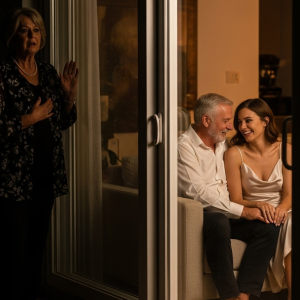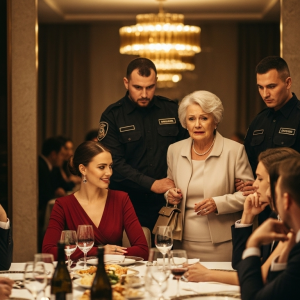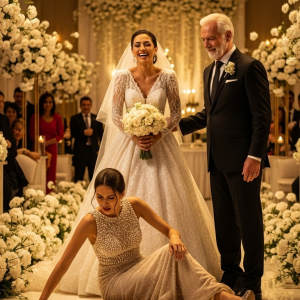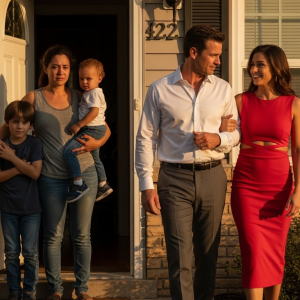Last Christmas, my sister Vanessa slapped my six-month-old baby across the face during dinner. Our entire family watched. Nobody moved. Nobody spoke.
But my husband, David, a military commander, slowly stood up. What happened next changed everything. Three days later, I discovered this wasn’t just about one slap. It was about a lifetime of being invisible in my own family.
The Sterling family Christmas dinner had always been Vanessa’s show. She arrived two hours late in her white Tesla, dragging in ring lights and a camera crew she’d hired to document an “authentic family Christmas” for her lifestyle blog. I stood in the kitchen doorway, bouncing my son, Lucas, on my shoulder as my mother, Patricia, rearranged the entire dining room to accommodate Vanessa’s filming setup. My father, Robert, sat in his usual corner chair, perfecting the art of selective blindness he’d honed over years of managing his daughters’ drama.
Vanessa had been promoting this dinner for weeks, promising her followers an intimate look at our holiday traditions. She’d neglected to mention that David had just returned from a six-month deployment, or that we’d driven three hours to introduce our son to his grandparents for the first time. None of that mattered when it came to Vanessa’s narrative.
David emerged from the guest room, looking sharp in his dress uniform. He caught my eye and gave me a small smile that meant everything would be okay. The dining room now looked like a magazine spread. Vanessa directed her cameraman around the table like she was shooting a commercial.
“Let’s get some gratitude,” she announced, aiming a speech at her camera while we sat in awkward silence. She spoke for ten minutes about the importance of family without mentioning a single specific thing about the actual people at the table.
The conversation that followed flowed in its predictable pattern. Vanessa dominated, updating everyone on her latest brand partnerships. I tried to share updates about our life at Fort Henderson and David’s recent promotion, but my stories vanished into the air, met with polite nods before the topic inevitably circled back to Vanessa. David noticed, of course. He always did. He’d ask me follow-up questions, trying to draw me back into conversations that had already left me behind.
Lucas, meanwhile, was getting tired. His cheerful babbling turned into the whimpering that precedes a meltdown. I suggested taking him to the guest room, but Vanessa immediately objected. It would ruin the “continent” she was filming.
“Babies are adaptable, Natalie,” she insisted. “A little fussing is normal.”
Patricia agreed. “You’re being overly cautious, dear. They need to learn to adjust.”
Lucas’s whimpering escalated to actual crying. I reached for him, but Vanessa held up a hand. She was still filming, reframing his distress as an “authentic moment of holiday chaos.” David’s face had gone completely still, the expression he wore when assessing a potential threat. He watched Vanessa with careful, calculating attention. Lucas’s crying intensified, the desperate wailing of a baby who had reached his limit.
That’s when it happened. Frustrated that Lucas was overwhelming her audio, Vanessa leaned across the table. Her hand moved in a blur.
The sharp crack of her palm against Lucas’s cheek echoed through the suddenly silent room.
Lucas’s crying stopped instantly, replaced by a shocked silence that felt like the air being sucked from the room. Then came a wail of pure bewilderment and pain that pierced straight through my soul. A bright red mark was already blooming on his tiny cheek.
Nobody moved. Patricia sat frozen, fork halfway to her mouth. Robert’s eyes were wide, but he remained glued to his chair. The cameraman kept filming.
But David moved. He rose from his chair with controlled precision. His six-foot-three frame seemed to fill the room, his dress uniform making him appear even more imposing. His voice, when he spoke, was quiet but carried an authority that commanded attention.
“Turn off the camera.” It wasn’t a request. The cameraman complied instantly.
David walked to the high chair and lifted our son, murmuring soft reassurances until Lucas’s cries subsided to hiccuping sobs against his shoulder.
“Vanessa,” David said, his voice still calm, but with an edge of steel. “You just struck my infant son. I need you to explain why you thought that was acceptable.”
Vanessa’s face flushed a defensive red. “He was being disruptive! I was trying to teach him that crying isn’t appropriate at the dinner table.”
“He’s six months old,” David replied, his tone eerily level. “He doesn’t understand boundaries. He understands that someone hurt him. And you struck him hard enough to leave a mark.”
Patricia finally found her voice. “Vanessa, honey, you shouldn’t have—”
“Don’t,” David interrupted, not raising his voice, but silencing her immediately. “Don’t minimize this. Don’t excuse it. And don’t you dare suggest that what just happened was acceptable.” He turned back to Vanessa. “You are going to pack up your equipment and leave. Now.”
“You can’t do that!” Vanessa sputtered, defensive anger replacing her shock. “This is my family, too! It was barely a tap. You’re acting like I committed some terrible crime.”
David’s expression didn’t change. “A tap that left a mark on my infant son’s face. Administered because he was crying, which is the only way he can communicate. And,” he said, his gaze sweeping across the table, settling on each of my family members, “not one of you moved to stop her. You all just sat there.”
The truth of his words settled over the room like a heavy blanket. Shame flickered across my mother’s face. My father finally looked away from his plate.
“Natalie,” David said, his voice gentle as he turned to me. “Pack Lucas’s things. We’re leaving.” He looked back at my family. “And we won’t be coming back.”
As I gathered our bags, I could hear Vanessa’s raised voice, full of justification and deflection. When I returned, David was standing by the front door, Lucas safe in his arms.
“You’re destroying our family over nothing!” Vanessa yelled as we walked out. “He’s not even crying anymore!”
David stopped and turned one last time. “The fact that you think striking a baby is ‘nothing’ tells me everything I need to know about your judgment,” he said. “And the fact that the rest of you are willing to excuse it tells me everything I need to know about your priorities.”
We drove home in silence. It wasn’t until we were safely back in our own house that the full weight of the evening hit me. I began to cry, not just for the slap, but for all the years of feeling invisible. David sat beside me, pulling me close.
“That’s what real family does,” he said softly. “They protect each other. They don’t excuse harmful behavior for the sake of peace.”
The war began three days later with a phone call from my mother.
“Natalie, honey, I know you’re upset,” Patricia said, her voice strained. “But Vanessa feels terrible. She wants to apologize.”
“Mom, she hit my baby because he was crying,” I said, my voice flat.
“She barely touched him, Natalie. You’re making this into something much bigger than it was. People make mistakes when they’re stressed. You know how important her work is to her.”
“Her work?” I felt a surge of heat. “She slapped Lucas because he was interfering with her social media content. Do you hear how that sounds?”
“You’ve always been dramatic about these things,” she sighed. The phrase hit me like cold water. How many times had I heard those words? How many times had my legitimate concerns been dismissed with that exact explanation?
“Now you sound just like David,” she added with a hint of disdain. “He’s the one who made the big scene, ordering people around like he was commanding troops. He doesn’t understand how we handle things.”
In my mother’s version of events, Vanessa had barely made contact with Lucas, everyone had overreacted, and David had turned a minor disagreement into a major crisis. My father called an hour later with a similar, rehearsed story.
“Vanessa said she was just trying to get his attention, Natalie. She never intended to hurt him. Children are resilient.”
By the time I received the third call, this time from a tearful Vanessa, I felt like I was losing my grip on reality.
“Nati, I feel so horrible,” she sobbed. “I don’t think I really hit him. I think I just touched his cheek. You know how these things can get blown out of proportion when emotions are running high.”
She wasn’t calling to apologize. She was calling to continue the family narrative that what I’d witnessed hadn’t really happened. When I ended the call, I felt like I’d been wrestling with smoke.
“She’s gaslighting me,” I said to David, standing over Lucas’s crib. “All of them are.”
“Yes,” he said quietly. “They are.”
“Why?”
“Because acknowledging what really happened would require them to take action,” he explained. “It would mean holding Vanessa accountable. It would mean admitting they failed to protect Lucas. It’s easier to make you the problem.”
The next morning brought a text that shattered any remaining hope for reconciliation. It was from a friend, Khloe. Saw Vanessa’s Instagram story. Are you okay?
With shaking hands, I opened the app. The story was a masterpiece of manipulation titled, “Family Drama & Moving Forward.” In it, Vanessa spoke of the challenges of blending different parenting styles and the importance of grace when “misunderstandings” occur. She never mentioned the slap, but painted herself as a well-intentioned aunt misunderstood by overprotective parents. The comments were overwhelmingly supportive, praising her maturity.
Less than twelve hours after a tearful phone call, she had publicly reframed the incident as my overreaction. She had positioned herself as the victim.
When David saw it, his expression grew grim. “She played you,” he said. “The late-night call was just intelligence gathering.”
I was done. I started documenting everything—direct quotes, screenshots, and notes from each phone call. For the first time, I was treating my family like adversaries. And as I organized the evidence, I began to see a pattern that had been happening for years.
The final piece of the puzzle came from my great-aunt Linda. “Honey,” she said over the phone, “it’s time you knew some things. There have been other incidents. Times when Vanessa hurt people, usually children, and the family covered it up. I can’t stay quiet anymore.”
Linda recounted a history dating back to Vanessa’s teenage years: being too rough with younger cousins, harsh with children she was babysitting. In every case, the family had minimized the situation, reframed the victim as “oversensitive,” and protected Vanessa from consequences. Linda also revealed that Vanessa had developmental delays as a child, and our parents had never transitioned from protecting a child with special needs to holding an adult accountable for harmful behavior.
“She knows exactly what she’s doing,” Linda said. “She’s learned that if she can make people feel sorry for her, she can get away with anything.”
Suddenly, decades of confusing interactions made sense. Lucas wasn’t her first victim. This wasn’t an isolated mistake; it was the latest act in a long-standing, hidden pattern.
The breaking point came when I received a certified letter from Vanessa’s attorney demanding I cease a “defamation campaign” against their client. The letter claimed I was damaging her professional reputation and demanded I sign a statement acknowledging that no assault had occurred.
“They’re trying to intimidate you into silence,” David said, his voice cold.
We hired an attorney Linda recommended. “Truth is an absolute defense against defamation,” she told us. “And you have substantial evidence.”
Our lawyer drafted a response that turned the tables completely. It detailed the evidence of the assault at Christmas dinner and noted the documented pattern of similar incidents witnessed by multiple relatives over many years. It also informed Vanessa’s attorney that we had evidence she had been commercially exploiting our family without our consent and were considering our own legal options.
The response was immediate silence. For three days, not a single call or text.
Then I received a call from a producer at the television network that had been considering Vanessa’s reality show proposal. The Christmas dinner footage was supposed to be part of her audition reel.
“We’ve received some concerning information,” the producer said. “We need to understand what actually happened during the filming session she submitted.”
I stuck to the facts. Two hours later, my phone exploded. The network was investigating, and Vanessa was panicking. That evening, she showed up at our house unannounced, her face streaked with tears and rage.
“You destroyed everything!” she screamed the moment David opened the door. “Years of work, all gone because you couldn’t just let it go!”
“I protected my child, Vanessa,” I said, stepping forward.
“I barely touched him!” she shrieked. “And only because he was ruining months of work! Do you have any idea how hard it is to create authentic family content when people won’t cooperate with the vision?”
The admission was stunning. In her fury, she had revealed everything. She wasn’t sorry for hurting Lucas; she was angry that he had failed to perform according to her production schedule.
“Get off our property,” David said, his voice deadly calm. “And don’t come back.”
“You can’t cut me out! I’m Lucas’s aunt!”
“You have no rights to a child you assaulted,” David replied. “If you come here again, I’ll call the police.”
She left screaming threats, but her rage had strengthened our position. David had recorded the entire interaction on his phone.
Six months later, Lucas took his first steps in our backyard. There were no cameras, no staged lighting, no audience beyond the two people who loved him most. It was authentic in a way Vanessa’s content never could be.
The legal threats had vanished. The reality show opportunity disappeared after the network conducted its research. My parents, faced with corroborating accounts from multiple relatives, could no longer sustain their narrative. Their relationship with us became stilted but safe, conducted under our strict supervision.
The most surprising development was the support from our extended family and our military community at Fort Henderson. Cousins and aunts thanked me for speaking up. Friends rallied around us, demonstrating the difference between a family of origin and a family of choice.
David was promoted to Lieutenant Colonel, partly based on his leadership during what his superiors characterized as a “complex family crisis.” His integrity in protecting his child was noted and commended. I began volunteering with a family advocacy program on base, helping other military spouses navigate similar conflicts.
Lucas’s first birthday party was a small, genuine gathering of our chosen family. There was no performing, no walking on eggshells. As I watched my son, fearless and confident, I felt a deep gratitude for the choice we’d made. He would never remember the Christmas dinner that changed everything, but he would grow up with the benefits of our decision: knowing that his parents could be trusted to protect him, that his needs mattered, and that love never required accepting harm.
The war that began with a slapped baby had ended with the only victory that mattered: a child who was safe, loved, and free.




